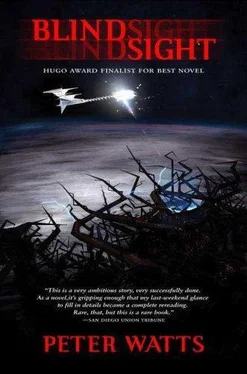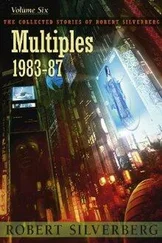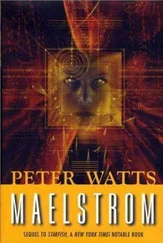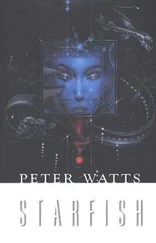Not genocide. Just the righting of an ancient wrong.
I’ve tried to take some comfort in that. It’s — difficult. Sometimes it seems as though my whole life’s been a struggle to reconnect, to regain whatever got lost when my parents killed their only child. Out in the Oort, I finally won that struggle. Thanks to a vampire and a boatload of freaks and an invading alien horde, I’m Human again. Maybe the last Human. By the time I get home, I could be the only sentient being in the universe.
If I’m even that much. Because I don’t know if there is such a thing as a reliable narrator. And Cunningham said zombies would be pretty good at faking it.
So I can’t really tell you, one way or the other.
You’ll just have to imagine you’re Siri Keeton.
Blindsight is my first novel-length foray into deep space — a domain in which I have, shall we say, limited formal education. In that sense this book isn’t far removed from my earlier novels: but whereas I may have not known much about deep sea ecology either, most of you knew even less, and a doctorate in marine biology at least let me fake it through the rifters trilogy. Blindsight , however, charts its course through a whole different kind of zero gee; this made a trustworthy guide that much more important. So first let me thank Prof. Jaymie Matthews of the University of British Columbia: astronomer, partygoer, and vital serial sieve for all the ideas I threw at him. Let me also thank Donald Simmons, aerospace engineer and gratifyingly-cheap dinner date, who reviewed my specs for Theseus (especially of the drive and the Drum), and gave me tips on radiation and the shielding therefrom. Both parties patiently filtered out my more egregious boners. (Which is not to say that none remain in this book, only that those which do result from my negligence, not theirs. Or maybe just because the story called for them.)
David Hartwell, as always, was my editor and main point man at Evil Empire HQ. I suspect Blindsight was a tough haul for both of us: shitloads of essential theory threatened to overwhelm the story, not to mention the problem of generating reader investment in a cast of characters who were less cuddlesome than usual. I still don’t know the extent to which I succeeded or failed, but I’ve never been more grateful that the man riding shotgun had warmed up on everyone from Heinlein to Herbert.
The usual gang of fellow writers critiqued the first few chapters of this book and sent me whimpering back to the drawing board: Michael Carr, Laurie Channer, Cory Doctorow, Rebecca Maines, David Nickle, John McDaid, Steve Samenski, Rob Stauffer and the late Pat York. All offered valuable insights and criticisms at our annual island getaway; Dave Nickle gets singled out for special mention thanks to additional insights offered throughout the year, generally at ungodly hours. By the same token, Dave is exempted from the familiar any-errors-are-entirely-mine schtick that we authors boilerplate onto our Acknowledgements. At least some of the mistakes contained herein are probably Dave’s fault.
Profs. Dan Brooks and Deborah MacLennan, both of the University of Toronto, provided the intellectual stimulation of an academic environment without any of the political and bureaucratic bullshit that usually goes along with it. I am indebted to them for litres of alcohol and hours of discussion on a number of the issues presented herein, and for other things that are none of your fucking business. Also in the too-diverse-to-itemise category, André Breault provided a west-coast refuge in which I completed the first draft. Isaac Szpindel — the real one — helped out, as usual, with various neurophys details, and Susan James (who also really exists, albeit in a slightly more coherent format) told me how linguists might approach a First Contact scenario. Lisa Beaton pointed me to relevant papers in a forlorn attempt to atone for whoring her soul to Big Pharma. Laurie Channer acted as general sounding board, and, well, put up with me. For a while, anyway. Thanks also to Karl Schroeder, with whom I batted around a number of ideas in the arena of sentience-vs.-intelligence. Parts of Blindsight can be thought of as a rejoinder to arguments presented in Karl’s novel Permanence ; I disagree with his reasoning at almost every step, and am still trying to figure out how we arrived at the same general endpoint.
References and remarks, to try and convince you all I’m not crazy (or, failing that, to simply intimidate you into shutting up about it). Read for extra credit.
A Brief Primer on Vampire Biology
I’m hardly the first author to take a stab at rationalising vampirism in purely biological terms. Richard Matheson did it before I was born, and if the grapevine’s right that damn Butler woman’s latest novel will be all over the same territory before you even read this. I bet I’m the first to come up with the Crucifix Glitch to explain the aversion to crosses, though — and once struck by that bit of inspiration, everything else followed.
Vampires were accidentally rediscovered when a form of experimental gene therapy went curiously awry, kick-starting long-dormant genes in an autistic child and provoking a series of (ultimately fatal) physical and neurological changes. The company responsible for this discovery presented its findings after extensive follow-up studies on inmates of the Texas penal system; a recording of that talk, complete with visual aids, is available online; [1] http://www.rifters.com/blindsight/vampires.htm .
curious readers with half an hour to kill are refered there for details not only on vampire biology, but on the research, funding, and “ethical and political concerns” regarding vampire domestication (not to mention the ill-fated “Taming Yesterday’s Nightmares For A Brighter Tomorrow” campaign). The following (much briefer) synopsis restricts itself to a few biological characteristics of the ancestral organism:
Homo sapiens vampiris was a short-lived Human subspecies which diverged from the ancestral line between 800,000 and 500,000 year BP. More gracile than either neandertal or sapiens , gross physical divergence from sapiens included slight elongation of canines, mandibles, and long bones in service of an increasingly predatory lifestyle. Due to the relatively brief lifespan of this lineage, these changes were not extensive and overlapped considerably with conspecific allometries; differences become diagnostically significant only at large sample sizes (N›130).
However, while virtually identical to modern humans in terms of gross physical morphology, vampiris was radically divergent from sapiens on the biochemical, neurological, and soft-tissue levels. The GI tract was foreshortened and secreted a distinct range of enzymes more suited to a carnivorous diet. Since cannibalism carries with it a high risk of prionic infection, [2] Pennish, E. 2003. Cannibalism and prion disease may have been rampant in ancient humans. Science 300: 227-228.
the vampire immune system displayed great resistance to prion diseases, [3] Mead, S. et al. 2003. Balancing Selection at the Prion Protein Gene Consistent with Prehistoric Kurulike Epidemics. Science 300: 640-643.
as well as to a variety of helminth and anasakid parasites. Vampiris hearing and vision were superior to that of sapiens ; vampire retinas were quadrochromatic (containing four types of cones, compared to only three among baseline humans); the fourth cone type, common to nocturnal predators ranging from cats to snakes, was tuned to near-infrared. Vampire grey matter was “underconnected” compared to Human norms due to a relative lack of interstitial white matter; this forced isolated cortical modules to become self-contained and hypereffective, leading to omnisavantic pattern-matching and analytical skills. [4] Anonymous., 2004. Autism: making the connection. The Economist , 372(8387): 66.
Читать дальше









